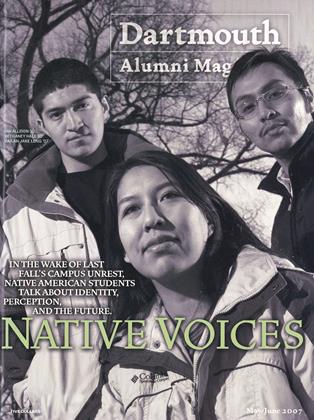Peter W. Kenyon ’80
On radio journalism from Alaska to the Middle East
May/June 2007 Jim Bildner ’75On radio journalism from Alaska to the Middle East
May/June 2007 Jim Bildner ’75On radio journalism from Alaska to the Middle East
"While growing up outside NewYork City I tuned into Dan Ingram, Cousin Brucie and the other WABC deejays. I still remember an introduction to a Top 40 hit called 'Turn the Beat Around' as, 'Here is a song about a woman who does strange things to vegetables.' No wonder political hit men love radio for their least scrupulous ads."
"The explosion of Internet journalism—and advocacy that masquerades as journalism-has changed dramatically the way news is reported , and not always for the better. Newspapers seem to be the canaries in the coalmine as a new generation grows up with little or no inclination to read them."
"In the time-pressed medium of modern news, sound gives me an extra element to my stories, freeing me of the chains of writing to visual images."
"My professors at Dartmouth managed to pound into me the ability to think critically, something I didn't really see the need for at the time but have been grateful for ever since."
"I followed a girlfriend to Alaska in 1981, thinking I'd go fishing with her brother. That proved impossible—as did our relationship—but she also volunteered at the local radio station. When the program director found out I could name three classical composers, I had a job."
"Alaska was a fantastic place to learn journalism. During the Roberto D'Aubuisson Arrieta era of death squads in El Salvador in the early 1980s when I heard of a young man in Alaska who had married a Salvadoran woman I was given the go-ahead to investigate this 'local angle.' I grabbed a tape recorder and a career as a radio journalist was born."
"My pursuit of Arabic is hampered by the fact that I'm not in one place long enough to schedule lessons, but I haven't given up."
"At their best, translators—when I'm not fluent in the local language—are a window to another world, relaying local beliefs, fears and prejudices in a way you could never learn on your own. When their skills are less than ideal, they can also distort."
"Given the nature of the NPR audience I occasionally get reminded that my English isn't perfect. I was recently chastised by a listener for referring to a 'one-week anniversary,' when, as we all know, anniversaries are measured in anni or years."
"Being embedded raises some very complicated issues for journalists. Iraq is one of the most dangerous places in the world for reporters. On a daily basis we have to choose between the need for self-imposed limits to stay alive and the restrictions that those limits place on you to tell your story in a meaningful way."
"Though neither my wife nor I could remember being asked about our religion upon meeting people when we were living in the United States, in Jerusalem it was the No. I question we were asked. On one occasion my wife attempted to deflect the question, joking that she was a pagan. Our host leaned forward and excitedly asked, 'Really? Which kind?' "
I "Here in Cairo shortly after 9/11 I heard some of the most bizarre conspiracy theories you can imagine, most blaming the CIA and the Mossad for the attacks. Over the years, though, I've been impressed by the diversity of opinion in the Middle East—a far greater diversity than is heard within the Arab-American or Jewish-American communities in the United States."
"While Americans seem to pay more attention to other parts of the world since 9/11, it's still not nearly enough, and too much of it is filtered through the prism of the war on terrorism."
"In so many conversations I have about the future of the region someone says, 'You Americans think every problem has a solution. This is the Middle East. Here we know that there are some problems that just don't have solutions.' They "be right."
CAREER: NPR correspondent based in Cairo (from which he has traveled to Baghdad eight times), 2004 to present; Jerusalem, covering the Israeli-Palestine conflict, 2001 to 2004; Washington, covering government and politics, 1995 to 2001; Alaska Public Radio, Petersburg, Alaska, 1981 to 1995 NOTABLE ACHIEVEMENT: With NPR team received the 2007 Alfred I. duPont-Columbia University Award for coverage of the aftermath of the U.S.-led invasion of Iraq EDUCATION: B .A., English and literature PERSONAL: Wife Nevette Brown, a commercial salmon fisher who spends summers in Alaska; grandfather was Max A. "Jack" Kenyon '22; father is Peter M. Kenyon '54
 View Full Issue
View Full Issue
More From This Issue
-
 Cover Story
Cover StoryNative Voices
May | June 2007 By CATHERINE FAUROT, MALS’05 -
 Feature
FeatureHostile Takeover
May | June 2007 By MARY SEYMOUR AND ANDREW MULLIGAN ’05 -
 Feature
FeatureA Different Kind of Homeland Security
May | June 2007 By JAMIE HELLER ’89 -
 Feature
FeatureNotebook
May | June 2007 By JOHN SHERMAN -
 Feature
FeatureAlumni News
May | June 2007 By Joe Novak '52 -
 PERSONAL HISTORY
PERSONAL HISTORYThe Pursuit of Happiness
May | June 2007 By Daniel Becker ’84
Continuing Ed
-
 Continuing Education
Continuing EducationHenry Paulson Jr. '68
Jan/Feb 2003 By Lisa Furlong -
 Continuing Education
Continuing EducationBrad Ausmus '91
Mar/Apr 2003 By Lisa Furlong -
 Continuing Ed
Continuing EdRob Saltzman ’76
May/June 2008 By Lisa Furlong -
 CONTINUING ED
CONTINUING EDC. Everett “Chick” Koop ’37
Nov/Dec 2009 By Lisa Furlong -
 CONTINUING ED
CONTINUING EDSharon Washington ’81
MAY | JUNE 2019 By LISA FURLONG -
 CONTINUING ED
CONTINUING EDAlison Fragale ’97
NOVEMBER | DECEMBER 2024 By Lisa Furlong

